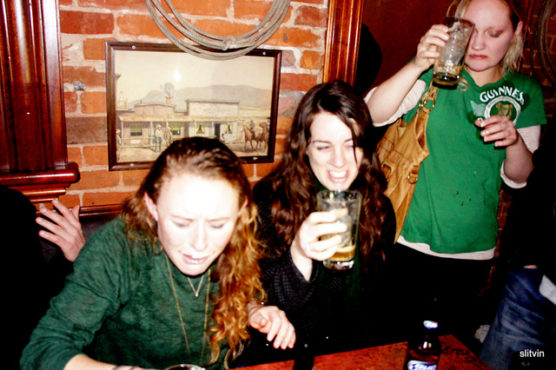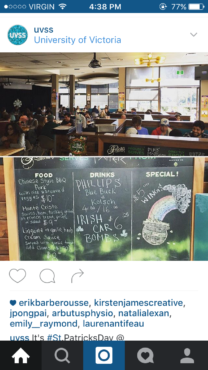Associating Ireland with alcohol isn’t harmless

Don’t be these people. Photo by Sam Litvin via Flickr
By the time I was in second year at UVic, I was already annoyed by the concept of St. Patrick’s Day. But when I checked my Instagram on March 17 and saw that Felicita’s was proudly displaying a deal on “Irish Car Bombs,” my annoyance quickly turned to anger.
I raised concerns with a member of the UVSS board, demanding they get rid of the drink. They apologized, and when I checked the pub later I saw that the sign had been changed to now offer a discount on “Irish drink.”
I spent about four or five days afterwards walking around with a scowl on my face, and explaining this story to as many people as I could. Usually, up until the point where I told them I had the sign changed, my friends wouldn’t look more than a little concerned.
So, I’d ask them if they knew what an Irish Car Bomb is. Most admitted they didn’t know.
“I’m all for people going out, getting wasted, and having fun. This time of year is stressful enough, and university students in particular deserve to have a day of relief. But I’m tired of having to endure the association of Ireland with alcohol.”
An Irish Car Bomb is set up like a jaegerbomb—it’s a shot glass of Irish cream and whisky dropped into a larger glass of stout and drunk all together.
But an Irish Car Bomb is also a type of explosive that was deployed during the Troubles — a period of 30 years from 1968 to 1998 which saw brutal and bloody fighting between the Irish Republican Army and the English army, who were fighting for Irish and English control of Ireland. Wired to car engines and designed to explode upon ignition, car bombs would kill 20 or so people at a time. They were known to kill children as young as three.
It was at this point in the story that my friends would display what I would consider the appropriate amount of anger and disgust towards Felicita’s was serving a drink named after this deadly explosive. It’s a similar kind of emotional response that you’d expect if the pub served drink called an “Iraqi suicide bomb,” or some “Sandy Hook Shooters.”
I don’t blame my friends for not knowing the history of the Troubles. But it does pain me when so many people who don’t know and don’t care to find out what kind of history they’re “celebrating” on St. Patrick’s Day.

A photo of Felicita’s selling Irish Car Bombs in 2016. Screenshot by Cormac O’Brien, Editor-in-Chief
The history of Ireland is littered with bloodshed and oppression; whether it’s Oliver Cromwell, who massacred entire Irish towns in the seventeenth century, or Margaret Thatcher, who tacitly endorsed the criminalization and murder of Irish republicans in the twentieth century, my heritage is one that survived in spite of hundreds of years of English rule.
“Now, Cormac,” you might say, (an expression that I can only hear said in the soft Irish lilt of my grandmother), “what the hell does this have to do with people getting drunk? Most people on St. Patrick’s Day aren’t celebrating Irish culture. They’re just looking for an excuse to drink.”
The problem comes with the association of Ireland and drinking.
If you’re a university student who’s just interested in dressing in green and enjoying some Guinness, the association of Ireland with alcohol seems pretty harmless. But once you understand the traumatic history of the region, you realize that that association isn’t trivial.
In his book published last year, David Bolton, a retired social worker, estimates that over 30 000 people in Northern Ireland alone suffer from Troubles-related PTSD.
Quoted in the Irish Times, Bolton says that figure “does not take into account people who suffer from Troubles-related complicated grief, depression, stress and other anxiety disorders and those who consequently developed a dependency on alcohol or street and prescription drugs.”
Counting those dependencies, the number of those affected might reach up to 200 000, Bolton says.
This is from just 30 years of conflict and war. Before that, Ireland had been under the oppressive rule of the English for at least another half a millennia before.
Alcohol is often an escape from traumas of the past — this is a fact that is evident across generations all around the world, and it’s painfully personal for me and my immediate family. I have seen and continue to see firsthand the effects that Ireland’s wars have had on the mental health of my relatives, and it’s why I can’t stomach the sight of a first-year wearing a “Kiss me, I’m Irish hat” while shotgunning a PBR.
I’m all for people going out, getting wasted, and having fun. This time of year is stressful enough, and university students in particular deserve to have a day of relief. But I’m tired of having to endure the association of Ireland with alcohol — an association that is played up for laughs and jokes when in reality it comes from hundreds of years of oppression and genocide — and I would encourage people to think (and drink) more carefully this year.






